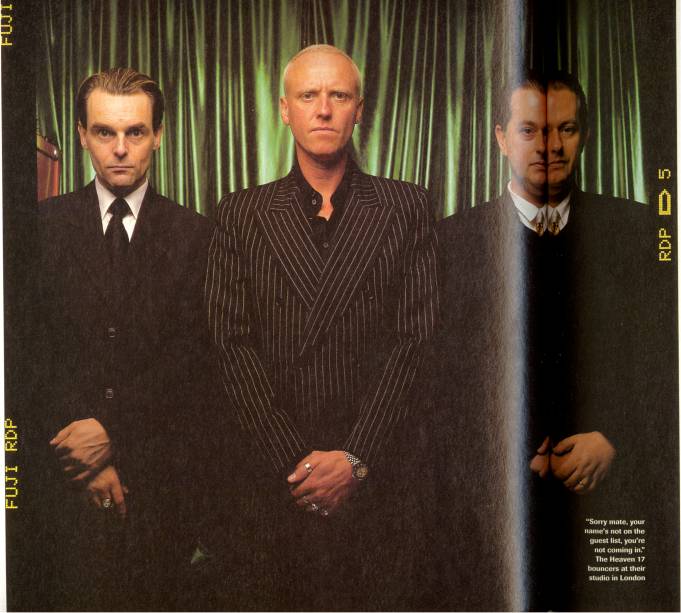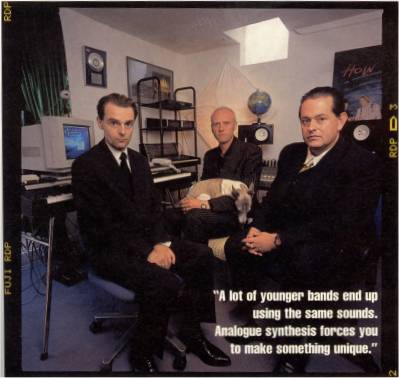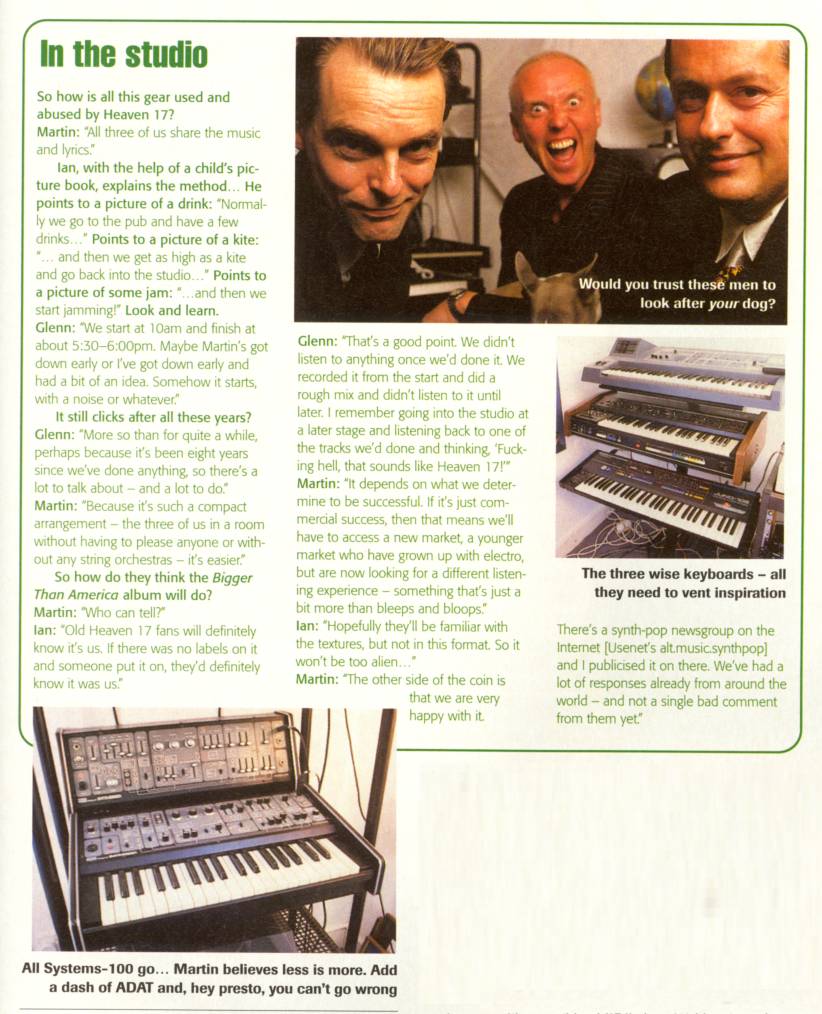ARTICLES AND REVIEWS

Future Music #52 January 1997 - Andy Jones

Future Music #52 January 1997 - Andy Jones

After seven years away, Heaven 17 are back.
But in this world of dance music and Britpop,
is there room once more for one of the 80s most influential synth bands?
Andy Jones finds out...
Back in 1981, one of music's best synth/funk albums ever arrived in the form of Penthouse And Pavement. It was the critically acclaimed debut album by Heaven 17, a trio comprising Ian Craig Marsh, Martin Ware and Glenn Gregory. The former two were no strangers to critical success, having already been half of The Human League and producing the fantastic pre-Dare albums of Travelogue and Reproduction. Heaven 17 scored major successes over the next seven years or so, most notably with the single Temptation, and were among the first bands to embrace sampling.
But as so often happened with synth bands throughout the decade (and, ironically, also with The Human League), the introduction of 'real' players, vast arrangements and other external influences saw the band's cutting edge erode and the last album, Teddy Bear, Duke & Psycho, sank virtually without a trace. All went quiet for seven years. But now the band are back, back with a new album, Bigger Than America. Back to the synths. Back to 'just' the original trio. And back to basics...
Seven-year itch
The last seven years haven't spelt total separation for Heaven 17. Ian and Martin went on to produce the Music Of Quality & Distinction, Volume 2 - an acclaimed compilation, the first incarnation of which back in 1982 kick-started the careers of several artists, including one Tina Turner. Ian then worked with Green of Scritti Politti (Glenn: "he's had his lip pierced!") and Right Said Fred for just 12 days, but in that time did enough to earn a lucrative credit on the massive I'm Too Sexy single.
Glenn formed the band Ugly but, unfortunately, one of Ugly's singles came out at the same time as the re-release of Temptation, which reached number two in the charts, taking the wind out of the sails (and sales) of the Ugly single. He then worked with a number of others and wrote some of the forthcoming ABC material with Martin Fry.
So after all this time, and with successful solo careers, why have the band decided to re-launch Heaven 17? Glenn: "It felt right. I can't remember who originally said it. I mentioned it to Ian, but he thought Martin was too busy, but then he [Martin] mentioned it to me!"
Ian: "It may seem like seven years to you but after the last album in 1989 we were doing stuff for about a year after that before we started doing stuff separately."
Martin Ware carved himself out a career as a successful producer, working with a number of people including Terence Trent D'Arby. He also produced I Say, I Say, I Saywith Vince Clarke and Andy Bell's Erasure...
"That was a major contribution to how this [new Heaven 17] album has turned out. Working with analogue synths for nine months awakened my realisation that we'd been led down the wrong path with digital synthesis. He has everything - rare Moog synths, the lot..."
Vince Clarke has stated that he hired Martin for his analogue expertise, but that Martin had forgotten much of it... Martin: "Not forgotten. On contemporary synths you don't have the access or time to the programming with all the multi-function buttons. You might tweak a couple of things, but you don't really get the time." Glen: "That was another funny thing, because I wanted to get back to just the three of us and for it to be like really early Heaven 17 or even early Human League - just three people and analogue synths. I didn't know if these two felt the same way, but it was exactly how Martin wanted it through working with Vince and Ian, too:"
The analogue gap
 And
that's the main reason why the new album was produced using only analogue
synths. Martin sums up his feelings for analogue over digital...
And
that's the main reason why the new album was produced using only analogue
synths. Martin sums up his feelings for analogue over digital...
"It's the speed of realising your ideas. What brought it home to me was when doing the / Say I Say I Sayalbum with Vince. I didn't want to be teaching him like the grandmother-sucking-eggs type of thing so after a while we reached an agreement whereby he'd work on a song for four or five hours, and then I'd come in later in the day and offer my opinion. More often than not, if he agreed with me he'd say, 'Come back tomorrow and I'll be sorted by then'. But instead of altering a few things, he'd start again and it would only take him two hours from scratch! I thought, 'God, if this was done on samplers or digital synths you'd take that time looking for the sounds!' That narrowing process is what a lot of younger bands don't understand: they end up using the same sounds and samples as other bands, so they're not carving a niche for themselves. Analogue synthesis forces you to create something unique." Glenn: "It's easy to have accidents, too, which a lot of the time are quite good:"
Martin: "They're very extreme accidents as well, not just the wrong MIDI channel playing the wrong sound. Working with analogue reminded us about what we found exciting when we started, so this album is like our one chance to be naive again. This time, maybe the environment is right with electro as an understood part of the culture:'
Was Heaven 17 ever tempted to imitate any of the current analogue trends in dance music? Glenn: "I don't think we use them in the same way as anyone else really. We're using them more as the instrument to write songs with."
So what does the band think of the latest dance scene? Martin: "I think that it is more to do with economics than anything else. It's easier to make dance tracks or to be remixers who then get record contracts. The whole structure has changed. In the days of early Human League and Heaven 17, if you couldn't write songs you didn't get signed. I think a lot of contemporary stuff is interesting, but the sheer volume makes people narrow down their options before they've even started being creative. It's only when they get an album deal, someone like Leftfield, where they feel they can spread their influences. People are scared to move away from the dance thing. To be honest, we don't have that much of a connection with it any more..'
Do the band think that they had an influence on any of today's electronic music?
Ian: "People say that we did, but I don't think so:'
Glenn, cheekily: "When I go to clubs, I say to people, 'Excuse me, I started all of this!' "
Martin [ditto]: "'So let me in free, please! Back in 1979 we were in pitched battle with guitar bands. We fought the electro wars for you, sonny, and don't you ever forget it!' "
Less is more
Heaven 17 are now signed to German-based Eye Of The Storm (run by the people behind Snap) through WEA. The new album Bigger Than America is, as you may have guessed, a return to the vintage Heaven 17 sound. This is mainly due to the reasons given, but also the loss of direction and drive which crept in on later albums...
Martin: "We lost faith in our ability and were giving responsibility to session players, so there were no synths left." Glenn: "Funnily enough, we wish we could find the demos 'cos we used to write them on synth. They're somewhere." Martin: "That was a symptom of that period of time. If sales aren't going too well, then confidence within the group drops and you start looking for other solutions. We were justified in what we were thinking, but with hindsight..."
Is there another parallel here with what happened to The Human League, who recruited musicians throughout the mid to late-80s, only to return to the synth in the 90s? Martin: "Well, there is major difference in that they've got a lot of equipment which is all interlinked. It's a very hi-tech version. Whereas we've got one System-100 with one amp. I'm not trying to be invertedly snobbish here, but the limitation of resources forces the creativity. If, for example, you have eight System-100s - effectively eight oscillators - you then have a polyphonic synthesizer. The original limitations we had with the first two Human League albums and with half the first Heaven 17 album is what made it interesting. Polyphonic synths didn't exist. The only true difference between then and now is that we were forced to put it down to dodgy eight-track tape, but now we use ADAT."
So in among all this vintage gear there is at least one digital piece of equipment...
"The advent of ADATs has enabled this album to happen. We recorded everything here apart from the backing vocalist. All the synths and vocals in a smallish room with a £35 microphone and three ADATs and a Mac. There are three monophonic synths and a couple of polys. That's it.
"We're forcing restrictions on ourselves on purpose. At any one time we could only have four or five things going at one time unless we sampled things so we had to make decisions at a very early stage in recording to say, 'Yes, this is good'. We're not keeping everything fluid forever, which is the tendency for people with these hard-disk recording systems or with everything MIDI'ed up. We'd go in and get five tracks down and build the song up. We never re-recorded something once it was done."
But we forget that with all this talk of analogue in the 90s, Heaven 17 pioneered samplers and digital synths... Glenn: "Oh yeah:' Points to Martin. "He was Mr Fairlight. Go on, how much did you pay for it?" Martin: "OK, when I bought it, it cost 25 grand..." Glenn: "I said you should have bought a fleet of taxis, man - you could have made more money!"
Have they ever been tempted by new synths jampacked with retro sounds and control?
Martin: "The nearest was the Waldorf Wave, but I wasn't knocked out by it"
Glenn: "I want to get one of those Nord Lead synths." Martin: "Yeah, I want the rackmount version. We can always use two! But we haven't raced out and bought anything. Technology hasn't made them any cheaper or better. Basically, they're sold at a top price to people who want analogue synths but can't be arsed searching them out."
Isn't it better than paying silly money for old synths? Glenn: "Yeah, they are stupid prices:'
Martin: "Well, if you've got any of these new synths left after testing them, pass 'em over!'
Hard luck mate, we keep 'em for ourselves... FM

FAVOURITE GEAR
Glenn: "I know what Ian's least favourite piece is and that's the System-100, 'cos he has to program it!" Ian: "No, I like it really. It's very therapeutic... But the E-mu e64 sampler is the closest thing we've got to playing with the sounds with all the 'cord' functions and I have a Peavey PC 1600 to control it" Glenn: "Everything we used to sample we used to feed through the System-100. I like the Roland MKS-80 a lot with some great sounds and the Roland S-760 sampler." Martin: "Where do you start? I've used the Roland S-750 for all my productions. I still don't think Akai has caught up. It's great. The filters are better for bass sounds." Glenn: "The strange thing about the S-760 is that there are only four analogue outputs and four digital, but they've stopped making the extra outputs board."
Martin: "Also that little Promars monophonic - a kind of precursor to the Jupiter-4. It has fantastic filters. That's the strength of early Japanese synths. It has a weird control - called a brilliance control - which is like a secondary filter, or a ring modulator filter, which I kind of synced to the harmonics. We used it for the basses on most of the new album."
KIT LIST
Synths
Sampling
Studio
THE REMIX STORY
 In
the early days, bands made do with 12-inch remixes that, more often than
not, just meant leaving the drum machine running for a few bars longer than
on the single. Heaven 17 were famous for their own radical remixes of their
own stuff (remember This Is Mine), but are now making use of that other 90s
phenomena, the remixer... Martin: "To be honest, were not thrilled about
the idea of using remixers at all, not because we don't respect what they
do, but because we find they make it very confusing for the consumer who
is confronted by endless versions of the same song. It's traditional now
so we can't really get out of it.,
In
the early days, bands made do with 12-inch remixes that, more often than
not, just meant leaving the drum machine running for a few bars longer than
on the single. Heaven 17 were famous for their own radical remixes of their
own stuff (remember This Is Mine), but are now making use of that other 90s
phenomena, the remixer... Martin: "To be honest, were not thrilled about
the idea of using remixers at all, not because we don't respect what they
do, but because we find they make it very confusing for the consumer who
is confronted by endless versions of the same song. It's traditional now
so we can't really get out of it.,
So what they did was to call in some of their own influences like Giorgio Moroder (see FM 51 for more on this).
Martin: "Gregorio did one that sounds like Kraftwerk - he's done a lot of stuff for Leftfield - and Motiv-8; there are 16 different versions and another that we haven't heard yet." Glenn: "I've heard it. It's good. It's by far the one that has least to do with our song! They've finally erased pretty much everything of us. I really like it!"
Are they secure in the knowledge that at least these remixers can introduce a new audience to the Heaven 17 sound?
Glenn: "I like it. When we first started we were going to keep it very pure. Just us, Heaven 17, and no remixers. But things have changed and I really look forward to listening to them." Ian: "The only problem with remixing is that you pay them a lot and you want to keep the brakes on it for a bit because, before you know where you are, the record company, on your behalf, will have run up a ludicrous amount and you could probably spend more money than it cost to record the album."
Martin: "Also, if they spend so much money on the first single, then they start looking at the figures for the second and third singles, and then they realise they haven't got enough to promote them, which then affects the sales of the album." Glenn: "We made the album as an album. It's not an album of singles, so we don't want to get too cut up by the single thing. We want people to go and buy the album." Martin: "But record companies, particularly in the UK, find it difficult to sell albums without singles to promote them. Perhaps we think about things in an old-fashioned way."